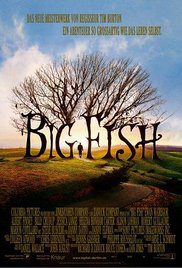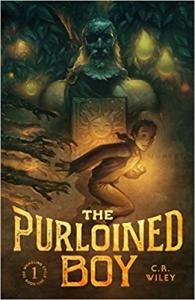
One of my favorite films–definitely in the top 5–is Tim Burton’s, Big Fish.
The story is about Edward Bloom, a traveling salesman with a knack for embellishing stories, and his disillusioned, and literally-minded son Will, who is both a journalist and a fact-checker by nature.
I won’t go into the story, I’ll just say this–the son learns in the end that his father isn’t a liar after all. There’s just more to his stories than the mere facts.
Here’s the trailer:
I tell a lot of stories.
Stop.
Do you see how that can be read two ways? If you’re a fact-checker, you probably read that this way, “I tell a lot of lies.” But if you were the sort of kid who looked out the window and daydreamed, then when you read that line you probably smiled inside.
Facts are important, but there is more to truth than facts. Facts for most people is all that truth amounts to, end of story.
But facts are inert, lifeless things, calling for interpretation. If you remember your first classes in science, way back in middle-school, you probably remember being told that first come facts, then come theories.
Theories were probably explained as a step down from the rock-solid world of facts. If that’s so, it is unfortunate because that’s not the way real scientists see things.
Theories are actually ways of seeing what the facts mean. That’s what the word “theory” means, by the way: seeing. The word has the same root as the basis for the word theater. What we really want to see is the truth. Now, truth is hard to see with absolute certainty, and scientists tend to cover themselves when it comes to this, saying they are prepared to revise their theories in light of newly discovered facts. But I imagine you see what this means: imagination is important for understanding the meaning of the facts. But it is also a fact that imagination helps scientists know which facts to look for in the first place.
Einstein appears to have understood this. His famous dictum, “Imagination is more important than knowledge” approaches what I’m talking about here.
But how do we keep from plunging down a rabbit hole of subjectivity?
I think there are two ways to prevent that. One I call, “Weak Imaginative Truth” and the second, “Strong Imaginative Truth”.
Weak Imaginative Truth
I think this is what Big Fish is all about. Here’s what I mean: the meanings we derive from reality exist in our imaginations as we experience the world.
I like to tell a story about a time I crashed my bike as a kid when trying to jump over 3 fork-lift pallets. It’s a fun story to tell, and I really ham it up. It truly happened, but what about all the ham that goes into the telling? Is the ham just another fact?
Well, no. But no account is ever just the facts. First of all, if I told all the facts I’d have a very dull and a very long story. What was the temperature the day of the jump? How many beads of sweat were on my forehead as my bike left the ramp? What about the mole on my friend’s arm, why not include it if the facts are what I’m really after?
I’m certain you see where I’m going with this. What you want to hear when I tell the story is my lived experience of the event and what it meant for me. The reality of the crash is reflected in my imagination, but selectively so. Some facts are inconsequential, others very important. And the most important facts receive lavish attention, like how I felt as I soared over the handlebars, and the pain I experienced as I landed on my hands and knees on the gravel of the parking lot.
To tell that story I need to recount the events, but also my experience of them. And sometimes a little artistic license is in order to really grab my hears and bring the meaning home. Because that’s where the truth lies, in the meaning.
Strong Imaginative Truth
Strong imaginative truth is the meaning that is there whether I see it or not. And for that to exist something, or better, someone, greater than me must exist to give it meaning.
Christians believe that God made the world purposefully. That means he has something in mind for it. It is not just as a collection of facts; it is a world of meaning.
The implications of this are quite profound and they affect everything. It means that the world itself is a meaningful place, and we can either live in harmony with the meanings given, or we can live in rebellion. (In which case the meaning given to our lives is: rebels.)
But we don’t just passively receive the story of the world, we participate in it and contribute to it. We’re sub-creators, as Tolkien put it, but the stories we tell are told with our lives.
What about the question I began with, is fiction just a well-told lie? The answer is, it depends.
Fiction is artistic license with reality. Like the tall-tales of Edward Bloom, fiction doesn’t literally happen. So you could say in that sense fiction is false. But when fiction is honest we know that already. These stories are not told to deceive, they’re told for other reasons. And sometimes those fictions tell the truth in the most revealing ways.
—
If you would like to learn more about my fiction (meaning the stories I tell in books), visit: crwiley.com.
And for my latest work of fiction, The Purloined Boy, you can purchase it in hardback from Canonball Books.













